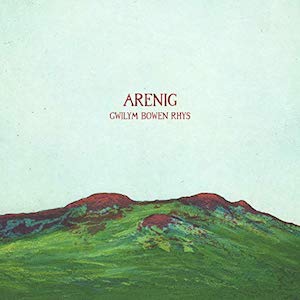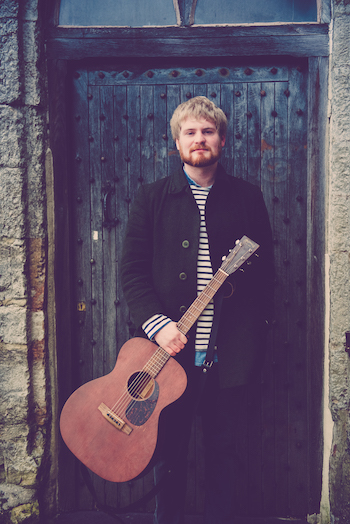 Gwilym Bowen Rhys – Arenig
Gwilym Bowen Rhys – Arenig
Recordiau Erwydd – Out Now
There was a time when Welsh singer and collector Gwilym Bowen Rhys would have been known for his work in rock band Y Bandana and his sibling folk trio Plu but, after his masterful debut album of traditional and original songs, O Groth y Ddaer (From the Womb of the Earth), he was quickly considered something of a special solo artist dedicated to studying and singing songs from the Welsh tradition (in April this year, he picked up ‘Best Solo Artist’ at the inaugural Welsh Folk Awards). Having also released Detholiad o Hen Faledi (A Selection of Old Welsh Ballads) in 2018, Arenig is Bowen’s third album and it should confirm him as an important figure in Welsh and indeed British folk music tradition. With artists like Gwilym, along with fellow Welsh singer Gwyneth Glyn and Welsh band Alaw, it is good to see more traditional Welsh acts getting significant recognition.

Another pair of beauties in the middle of the set are ‘Lloer Dirion Lliw’r Dydd’ (‘Gentle Moon the Colour of Day’) and ‘Clychau’r Gog’ (‘Blue Bells’). A duo of love odes, the first old, the second a Gwilym original, ‘Dydd’ uses drone instrumentation to create a darker undertone for a tale of love and appreciation from an emotionally wounded man. Here Gwilym takes his voice down and burrs it to fit the low notes of the Shruti box and the mournful viola lines, whereas for the less wrought and more simply joyous ‘Gog’, his voice is suddenly clear and bright, with no sign of menace or trauma. The latter song is unambiguously sunny and romantic and the mandolin notes behind the guitar lift the whole thing even further. The overall effect through the two songs is of the central core to the album giving us light and shade and old and new through tales of love told with the most accomplished of musical and vocal tools.
Most of the music here is sung, but there are two delightful instrumentals that nicely break up the set, one coming in the first half, the other later on. ‘Jac Yr Oil’ / ‘Hud Sir Fôn’ is a gorgeously gentle violin led piece that brings early Lau arrangements to mind. An original nostalgic reminiscence in part, the tune flows softly along with a halfway break for a beautiful harp line, before the violin and guitar come back in alongside it to play the jauntier traditional half. ‘Jeri Bach Gogerddan’ is another original piece of music written for the Welsh Romani gypsies and its structure rolls along as a perfect travelling tune. At just over two minutes, it is the shortest track here, but is a perfect lead-in to the final third of the album.
Towards the end of the set comes ‘Cardod’ (‘Charity’), an eight-minute blend of seventeenth-century poetry and eighteenth-century fiddle music (‘Toriad y Dydd’). The harp here sits behind some beautiful violin and viola playing and the arrangement is patient but quite playful and lilting, particularly in the final third of the medley, when acoustic guitar and low percussion joins in with the harp and fiddle. It is possibly my favourite arrangement on the album, particularly when paired with the following tune ‘Arenig’, a poem read by Euros Bowen, Gwilym’s great uncle, about the eponymous mountain in north Wales, set to Shruti box, violin and harp music in another original arrangement. The strings offset each other nicely, but the lyrics from Euros are a revelation and shift the track into something that feels quite ancient and romantic. Again, it is a unique piece, perfectly judged and beautifully poised. Finishing the set is ‘O Deuwch Deulu Mwynion’ (‘Oh Come ye Gentle Family’), a seventeenth-century carol set to a traditional fiddle tune and original music. After two preceding pieces of lower-pitched music, Gwilym ends things on a euphoric note, with trombone coming in to join the harp and strummed guitar for an optimistic song about the coming of spring. It rounds off a stunningly consistent set of songs and tunes, meticulously conceived and arranged, fully celebrating his country and its history.
Arenig really is quite a magnificent achievement by a prodigious talent. Gwilym Bowen Rhys is an artist still in his twenties who already has three hugely impressive solo albums to his name. In a strange way, he reminded me abstractly of Jake Xerxes Fussell, another musician and collector dedicated to his craft and his land and putting out damn near perfect interpretations of his discoveries along with (in Gwilym’s case) original compositions. Arenig is a work of art that is as reassuring in its quality for modern folk music as it is confident and entertaining. A highly accomplished and original album that cannot fail to dazzle in just about every way.
https://www.gwilymbowenrhys.com

